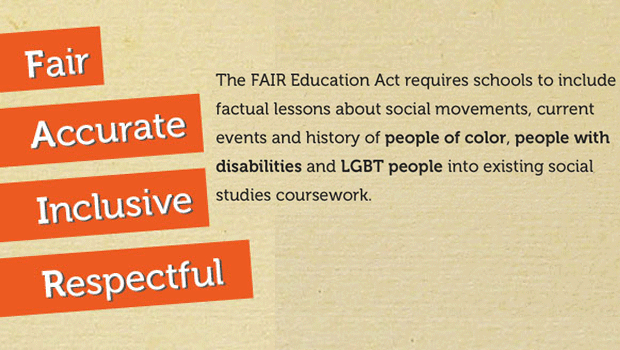GSA advocates the FAIR Education Act
May 6, 2015
Not many high school students know about the Stonewall riots. Less so Harvey Milk, Alan Turing or Bayard Rustin. The fact that Turing and Rustin were arrested only around 60 years ago due to their sexual identity may surprise and even appall some. Though only three of many who were a crucial part of history, school curriculums nationwide hardly cover the contributions they made to science and civil rights. Our history curriculum skims over these parts of American and Global history as their sexual orientation is deemed controversial. But their achievements, and contributions, many of which made our society the way it is now, should not be excluded from our textbooks because of that. Current Dougherty high school junior and President of the Gay Straight Alliance club, Kyle Doan, and Club Advisor, Mrs. Gardiner (who also teaches Spanish), are working to change that by advocating for the FAIR Education Act ( Fair, Accurate, Inclusive and Respectful ), which was passed in California in 2011, to be fully implemented and recognized in the San Ramon School District. They want to have students not only learn about important history figures that were a part of the LGBT community, but that of historical figures who were minorities. In a school where minorities is the majority, they believe that we, as a minority, should not only learn about the history of the white man, but that of Chinese, Korean, Japanese, Indian, Pakistani, Latino and European descent. They believe that a student should learn about their own history, their own culture and background. I sat down with them to talk about the reason and purpose behind this.
A: Angela
G: Mrs. Gardiner
K: Kyle Doan
A: Tell me about what it is you’re trying to achieve and get the school district to make happen.
G: We want to create a more inclusive learning place in our schools.
K: Yes, we do learn important things here at school, but what we’re trying to say is that there are other parts of history that should be discussed.
G: There are parts of history that should be discussed and legally discussed to students because of the FAIR Act.
A: Was there an event that triggered you to want the school district to fully implement the FAIR Act? A source of inspiration or a relevation of sorts as to why you felt that this change was necessary?
G: Once the law (FAIR Education Act) has passed, it was disappointing to see that there was no district wide implementation of the law for the first year or two after the law took effect.
K: When it (FAIR Act) has passed, I was just a freshman. In health, we did not learn about sexuality and gender (orientation). Now, in US History, we aren’t learning about things that should be discussed, such as Black History Month. Things like that make you wonder why we’re only learning with a white man focus. Groups highlighted in the FAIR act should be covered and taught more.
A: For our readers who don’t know, the FAIR Act only applies to Californian schools. Why do you think this (law) hasn’t been passed in other states as well?
K: In certain communities, like in the Bay and Los Angeles, the minorities are the norm. Those communities are so diverse that I think the FAIR Act actually has to be implemented because of the large numbers of minorities.
G: It was because our Senator was brave and vocal enough to stand in front of the state senate and pass the bill. Also, many more parts of the state (compared to other states) are much more accepting and encouraging which gives more support for these types of changes at school and at the political level.
A: Are there any new things or events that show as to how the FAIR Act is being implemented so far?
K: Dougherty celebrating Chinese New Year. It’s an example of the school appreciating the diversity and culture of the students here.
(Author’s Note: Chinese New Year is celebrated by Koreans, Japanese, Vietnamese, Mongolians and Tibetans as well. It’s really the lunar new year based on the Chinese lunisolar calendar).
G: I think the Fair Act is trying to do it in a more direct educational and curriculum way, but I think it’s a good start.
A: What significant parts of history that involve the LGBT community and minorities would you like to see in Californian textbooks?
G: The example you brought up, of how homosexuals were in World War II, is a good one.
K: Yes. Those like Alan Turing, or Harvey Milk whom are not even listed in our history textbooks. The Stonewall riots and Bayard Rustin are other examples.
A: Last Question. Why aren’t we getting new history textbooks if the FAIR Act has already been implemented? Why isn’t the change profound in schools?
G: Well, to sum it up, the textbook adoption process is frozen due to a lack of money. There are a certain number of years that a textbook lasts in the district, but that was all put on hold because of the lack of money. We hope that teachers will find and search for external resources and outside teaching materials to teach students about themselves, the LGBT community and the different minorities we have.
The FAIR Education Act affects every one of us. Students here at Dougherty have so many unique cultural backgrounds that should be addressed. For those interested, and for those with questions about the FAIR Act, go to http://www.cde.ca.gov/ci/cr/cf/senatebill48faq.asp

